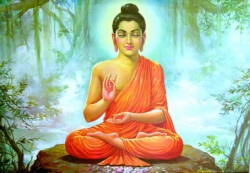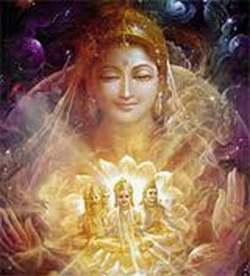Buddha Mind
The seeds in a Buddha’s mind are all pure seeds which no longer change, and the name ālaya-vijñāna is then changed to amala-vijñāna, the stainless consciousness.
Its interesting how different traditions package the notion of realization and the practices leading to it.
For some they consider there is a "potential" mind of enlightenment that arises when various misconceptions and obscurations are removed or purified.
For some others the idea is one of there being an "untouched" enlightened self-nature that lies behind our current mind as ego-consciousness, that this current ego-mind dissolves into.
Again for some the enlightened mind is considered to be our current awareness as a witness to all experience yet remaining just as it always is.
All of these ideas are descriptions as to how reality is seen from various limited perspectives.
But each one, even though relatively "workable" to a point, miss the opportunity to really hit the mark, so to speak.
We don't have "two minds", one enlightened and the other ignorant and impure.
Rather we have only one mind.
When we recognize the "empty nature" of our current state of mind, no matter how seemingly burdened and obscured it may be, we discover this mind is itself the "enlightened mind".
When the empty nature of the mind is recognized, all the various "impurities" and "obscurations" instantly lose their ground as there is no longer a substance for their roots to cling to.
This is why it is said the we are all "Buddhas".
Our mind when recognizing its true nature as emptiness is realized to be the Buddha Mind.
The nature of our mind is essentially a knowing emptiness whose appearances are its luminosity.
When the luminosity aspect becomes too intense the "emptiness" aspect is not noticed. It can render consciousness a bit bewildered.
The elaborations that evolve from that overwhelming, vivid luminosity are our sense of self, self-stories, fixations and all the causes of suffering.
These all evolve because the mind in its bewildered condition conceptually grasps for some ground and solidity where there is none to be found.
When that same mind recognizes the empty nature of that vivid luminosity itself, it self-releases.
This is like re-claiming the throne of Buddhahood that was always yours while remaining in the exact same place that you have always been.
How do we recognize the empty nature of our mind? What does the "empty nature of our mind" even mean?
If we simply examine one thought thoroughly, we will discover that it dissolves as fast as it appears. Its like a transparent hologram that appears in space and then disappears.
You can't find any graspable substance no matter how much you try. In this way we conclude that our thought was empty of any actual enduring substance.
But what remains when the thought vanishes? Not just a complete nihilistic absence, but rather a vivid and knowing awareness remains.
This vivid, knowing, empty awareness is the true nature of thought, of every thought. All of our personal stories are made up of these empty thoughts.
Ours sense of self is made of these thoughts, empty thoughts.
Outside of our empty thoughts there are no other causes of our suffering and anxiety.
All of our negative emotions and passions are the same, empty of substance when examined. We can notice and recognize the empty nature of our suffering because of the empty nature of our thoughts.
When we recognize the empty nature of our suffering authentically and directly, our suffering releases.
When we recognize the [[empty nature of our [thoughts]] we immediately realize that our thoughts are themselves "awareness" as a vivid knowing.
Thoughts have themselves revealed their nature to be empty awareness.
When we recognize the empty nature of our negative emotions, we immediately realize that our negative emotions are themselves " knowing awareness".
The luminous aspect now appears as radiant and vivid aware knowing.
When we recognize the empty nature of our mind, we immediately realize that our mind, just as it appears, is itself the vivid awareness and knowing of a Buddha.
When this is fully recognized and not just intellectually understood, a profound wisdom will arise that is the wisdom of a Buddha in full recognition of itself.
We then continue by simply resting in that realization.
If we lose our clarity, we simply examine our condition again in order to recognize the inherent nature of its emptiness.
This is also true of all perceptions and sensations.
When we experience the true nature of sensations, we find them to be "unfindable", and therefore empty.
This is the same with perceptions.
As the Karmapa Rangjung Dorje 3rd pointed out: "When a thought disappears, does it disappear and allows awareness to be seen, or is the thought actually itself "awareness?".
We can see the same with all experienced phenomena...







